Edited by Carla Knorowski, Ph.D.
An imprint of Rowman & Littlefield
Distributed by NATIONAL BOOK NETWORK
Copyright 2015 by Abraham Lincoln Presidential Library Foundation
Essay by Samuel R. Harris courtesy of Illinois Holocaust Museum and Education Center
All rights reserved. No part of this book may be reproduced in any form or by any electronic or mechanical means, including information storage and retrieval systems, without written permission from the publisher, except by a reviewer who may quote passages in a review.
British Library Cataloguing in Publication Information Available
Library of Congress Cataloging-in-Publication Data Available
ISBN 978-1-4930-0912-1 (hard cover)
ISBN 978-1-4930-1766-9 (e-book)
 The paper used in this publication meets the minimum requirements of American National Standard for Information SciencesPermanence of Paper for Printed Library Materials, ANSI/NISO Z39.48-1992.
The paper used in this publication meets the minimum requirements of American National Standard for Information SciencesPermanence of Paper for Printed Library Materials, ANSI/NISO Z39.48-1992.
The views, opinions, and positions expressed by the authors who have written essays for this publication do not necessarily reflect those of the Abraham Lincoln Presidential Library Foundation.
CONTENTS
Preface
I t is a two-page, handwritten essay on white, blue-lined paper. The paper is not unlike the standard blue-lined paper you would find in a composition bookthe kind used in schoolsporting a black and white marble-finished cover. The pages themselves measure seven-and-a-half by nine-and-a-half inches. The authors 19th century, right-slanted cursive fills 23 of the 25 available lines on the first page, eight on the second. The neat and even penmanship and rich, black, iron gall ink draw you in. The authors words draw you in further. His eloquence draws you in completely. The pages weigh much less than an ounce, but carry the weight of the world. It is the Gettysburg AddressAbraham Lincolns masterpieceone of the greatest speeches in the annals of history.
It was written on the occasion of the dedication of the National Cemetery at Gettysburg, a ceremony that took place a little more than four months after what was, and still is, the bloodiest battle ever fought on American soil. Approximately 52,000 Union and Confederate soldiers were killed, wounded, or went missingthe green rolling hills of Gettysburg, Pennsylvania, were awash in a sea of crimson blood as Union and Confederate forces fought the Civil Wars tide-turning battle. When the smoke cleared and the deafening sounds of gunfire and exploding shells fell silent, all that remained was the sobering stillness of death, which continued to linger even as preparations for the dedication were taking place, even more so on that solemn day. The scars and ravages of war were still omnipresent as the civic procession was directed to salute the President of the United States, and then advance and occupy the area in front of the stand, the military leaving sufficient space between them and the line of graves for the civic procession to pass.
The program for the day was simple: A prayer, then a speech by the great orator Edward Everettboth preceded and followed by music. After that, a few dedicatory remarks by the President of the United States were to be delivered by Abraham Lincoln. His two-minute Address was in sharp contrast to Everetts two-hour oration, not just in length, but in outcome. Lincolns Address stirred the soul; instilled a sense of purpose; called its audience to action; and righted a lost and faltering nation, setting its sails on course for a new birth of freedom.
The speech was immediately recognized for what it was, a national treasure. In May 1864, a mere six months after it was delivered, the Address was reprinted in a volume edited by Alexander Bliss, published in Baltimore by Cushings and Bailey, of the facsimile handwriting of famous Americans. While Lincolns Address was not the first selection printed in the bookthat honor was reserved for Francis Scott Key and The Star Spangled Bannerit immediately followed the American anthem, a tribute to the greatness of the 16th President and his dedicatory remarks. Lincoln and the Address were followed in order by selections from Washington Irving, Oliver Wendell Holmes, John Greenleaf Whittier, and only then by Edward Everett. Lincolns handwritten version of the Gettysburg Address originally in the Bliss book now hangs in the Lincoln Bedroom of the White House.
The occasion of the 150th anniversary of the writing and delivery of the Gettysburg Address most certainly provided a historic opportunity for solemn commemorations and possibly, sad to say, unimaginative, well-worn, though well-meant tributes. When a person has been studied, celebrated, and commemorated for more than a century and a half, having had more than 18,000 books, long, middling, or tiny written about him, as Lincoln has, it is difficult to be original, to say or do something that hasnt been said or done before. Its easy to become complacent. After all, it is Lincoln and the Gettysburg Addressno dressing up required. Simply display the document in all its glory and have an eloquent speaker recite it at the precise moment in time that Lincoln had delivered it 150 years earlier. That sort of tribute is simple, safe, and generally meets the expectations of Lincoln-loving scholars, armchair historians, and devotees around the world. But is it enough? Certainly not.
While simple is a word which might be equated with the preferred way of life of the rail splitter from Illinois, safe isnt. After all, this was the man who risked the ire of many by opposing the Mexican War, pushing through Emancipation and abolition policies, and moving forward with conscription. So while displaying and reciting the Gettysburg Address was a simple and safe way for the Abraham Lincoln Presidential Library and Museum and its Foundation to commemorate the 150th, it wasnt the only path we would travel. We didnt want just to meet expectations, we wanted to exceed them. The magnitude of the man and his words deserved something more, something original, something, dare we say, larger than life. Enter 272 words.
272 wordsthe number of words Lincoln used in the Gettysburg Address. Challenged to speak about the enormity of Gettysburg, Lincoln used a mere 272 words, in 10 sentences, to convey the greatest, most important message of the timesome say of all time . We still hold sacred its message. To commemorate its sesquicentennial, we decided to challenge people from around the world to write 272 Words in the spirit of Abraham Lincoln.
This, for many, was daunting to grasp, let alone attempt. Many refused the challenge on the basis that they could never write anything that could approximate, let alone top, the simple yet profound eloquence of Lincoln and the Address. We found ourselves doing more than our share of explaining that the point of the 272-word challenge was not to try to top the Gettysburg Address, write as well as Lincoln, or change the course of history. It was simply to celebrate the 16th President and his words. It was hoped that essayists, in trying to get their message across in only 272 words, would come to realize in a deeper, more personal way the greatness of the Address and just how eloquent and gifted a communicator Lincoln was.


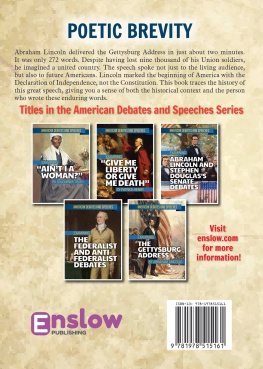
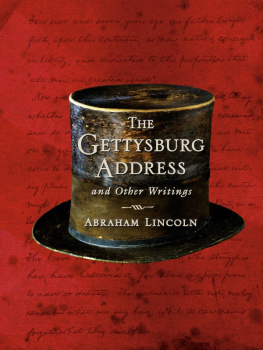
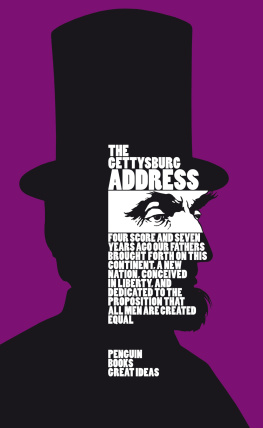

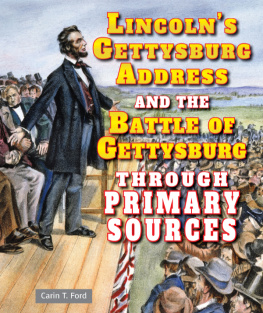
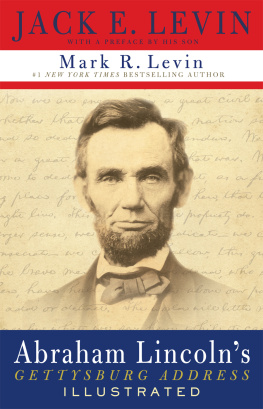
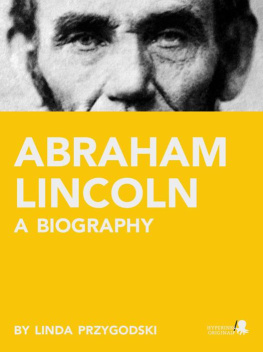
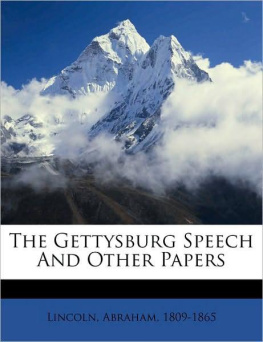




 The paper used in this publication meets the minimum requirements of American National Standard for Information SciencesPermanence of Paper for Printed Library Materials, ANSI/NISO Z39.48-1992.
The paper used in this publication meets the minimum requirements of American National Standard for Information SciencesPermanence of Paper for Printed Library Materials, ANSI/NISO Z39.48-1992.